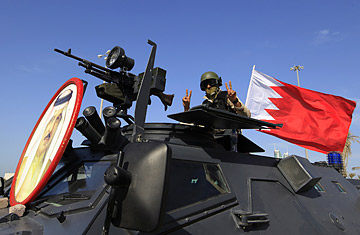
A member of the Gulf Cooperation Council force flashes the victory sign as he guards the entrance to Manama's Pearl Square in Bahrain on March 19, 2011
Pilots winging over raging Libyan battlefields in Mirage and F-16 fighter jets. A convoy of troops and tanks rumbling to the aid of an embattled partner. Defiant words for a regional bully bent on meddling in domestic affairs.
These are just some of the hallmarks of the new-look Gulf Cooperation Council (GCC) — the bloc of six Arab nations that is shedding its image as a somnolent, oil-rich cartel and propelling itself forward in the role of hands-on military campaigner in the uprisings that are reshaping the region. It has already intervened — mainly with member Saudi Arabia's troops — in the rebellion in GCC compatriot Bahrain. This is the GCC 2.0 and the world, and most especially Iran, is watching.
The unprecedented show of force has so far boosted pan-Arab pride, brought accolades from Western allies and reinforced a bulwark against ever expanding Iranian influence. "This level of involvement just sets an incredible precedent," says John L. Esposito, professor of religion and Islamic studies at Georgetown University and author of The Future of Islam. "These governments usually use diplomacy or write a check. Now, [the GCC member states] have taken the opportunity to step out front in other countries on issues that are domestically driven."
It began with the GCC's deployment in March of some 1,500 Saudi-led security forces and armored vehicles — part of the Peninsula Shield force. The move helped put down a mostly Shi'ite revolt on the streets of Manama. It was a controversial gambit by a group mainly composed of Sunni monarchies, one that was denounced by Shi'ite-ruled Iran and Iraq (Baghdad is the current head of the Arab League). On BBC Arabic on March 26, Iraqi Prime Minister Nouri al-Maliki warned that the GCC intervention risked setting off a regionwide sectarian war.
"It's potentially very important. It's certainly a crossroads, a potential flash point between Sunni and Shia. This engages a lot of people's interests — Saudi, Iraq and Iran. The demonstrations and the ferocity of the response caught everyone by surprise — and so has the GCC reaction," says Kenneth Pollack, director of the Saban Center for Middle East Policy at the Brookings Institution and former staff member of the U.S. National Security Council.
The GCC power play continued with Qatar and the U.A.E. committing military muscle — including Qatari pilots and a dozen combat planes — to the punishing air strikes that the Western-led coalition hopes will protect Libyan rebels and civilians from the army of Colonel Muammar Gaddafi. General Jean-Paul Palomeros, commander of the French air force, described the GCC states' involvement as "a turning point in history. It really shows the courage [of Qatar] to enlist at our sides."
But in terms of what the experts consider the greatest potential conflict in the region — the rivalry between the Gulf states and Tehran — the GCC's gloves really came off on Sunday. Following a late-night meeting of foreign ministers in Riyadh, the GCC blasted Iran's "flagrant interference" in the region and blamed Iran for actively destabilizing and "violating the sovereignty" of their countries. The meeting came after the Iranian government's foreign-affairs and security committee said Thursday that Saudi Arabia, the GCC's most populous member, "should know it's better not to play with fire in the sensitive region of the Persian Gulf." That only slightly veiled threat was not taken lightly by the GCC, now fresh off two recent military maneuvers and possibly banking on long-standing military ties with the U.S.
What has ensued from these back-and-forth barbs has been a full-on verbal battle that has brought in the ongoing conflicts in Bahrain, Yemen and Kuwait as well as threats of diplomatic action and fears of sectarian war. In its statement, the GCC "severely condemned Iranian interference in the internal affairs of Bahrain, which is in violation of international pacts." The bloc also criticized "the blatant Iranian interference in [GCC member] Kuwait through planting spy cells on its territory," in reference to a Kuwaiti court case last week in which two Iranians and a Kuwaiti were sentenced to death for their roles in an alleged Iranian spy network. The two countries recalled their ambassadors and expelled diplomats.
The GCC said Iran's "playing with fire" salvo had the potential to "fuel sectarianism" between the region's Shi'ite and Sunni, and the meeting "condemned the baseless accusations by the Iranian parliament regarding Saudi Arabia and considers it a hostile stand and provocative interference." The statement concluded with a call for Tehran to "stop these hostile policies and respect the rules of good neighborliness ... so as to preserve the security and stability in this region, which is key for the entire world."
It took only hours for Iran to respond; its Foreign Ministry said Sunday that the tension between Tehran and the GCC was the result of "Western and Zionist conspiracy" aimed at "sowing discord between Islamic countries." "We advise regional governments to heed the demands of their people in order to stop such conspiracies," Ramin Mehmanparast, an Iranian Foreign Ministry spokesman, told reporters, while insisting unity among Muslims was the key issue for Iran.
The vitriol remains at the diplomatic level. Even so, the tone of the GCC's rebuttal to Iran has raised the standard for defiance. The verbal standoff between a reinvigorated GCC and a typically bellicose Tehran is best described as a regional war of words — at least for now.
